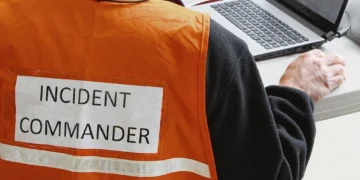In today’s interconnected world, effective communication and collaboration between individuals, organizations, and even nations are paramount.
This is where a liaison officer plays a crucial role. A liaison officer serves as a bridge between different entities, facilitating information exchange, coordinating activities, and resolving conflicts.
Their expertise is valued across various fields, including government, corporations, non-profit organizations, the military, and academia.
Responsibilities Of A Liaison Officer
1. Establishing And Maintaining Communication Channels
A liaison officer acts as a central point of contact, ensuring that information flows smoothly between different parties.
They establish and maintain effective communication channels, utilizing various mediums such as meetings, emails, phone calls, and digital platforms.
2. Facilitating Information Exchange
The liaison officer collects, analyzes, and disseminates relevant information to the concerned parties.
They ensure that accurate and timely information is shared, enabling informed decision-making and fostering collaboration.
3. Coordinating Activities And Collaborations
Liaison officers play a key role in coordinating joint initiatives, projects, or partnerships between organizations.
They facilitate collaboration by aligning goals, coordinating schedules, and ensuring effective cooperation among stakeholders.
4. Resolving Conflicts And Promoting Understanding
In situations where conflicting interests or misunderstandings arise, a liaison officer steps in to mediate and find common ground.
They possess strong problem-solving and conflict-resolution skills, allowing them to navigate complex situations and foster positive relationships.
5. Representing The Organization OR Group
Liaison officers often act as representatives, attending meetings, conferences, or events on behalf of their organization.
They serve as ambassadors, promoting their organization’s objectives, values, and interests to external stakeholders.
Skills And Qualifications Of A Liaison Officer
To excel in the role of a liaison officer, certain skills and qualifications are essential:
1. Excellent Communication Skills
Liaison officers must possess exceptional verbal and written communication skills to convey information clearly and concisely.
They should be adept at tailoring their message based on the audience and context.
2. Strong Interpersonal And Relationship-Building Abilities
Building strong relationships is at the core of a liaison officer’s responsibilities. They must be approachable, empathetic, and skilled in building rapport with diverse individuals and groups.
3. Organizational And Multi-Tasking Skills
The ability to stay organized and manage multiple tasks simultaneously is vital for a liaison officer. They must prioritize effectively, meet deadlines, and handle various responsibilities efficiently.
4. Problem-Solving And Conflict-Resolution Skills
Liaison officers encounter challenges and conflicts regularly.
They need to possess strong problem-solving abilities, think critically, and navigate complex situations while maintaining a diplomatic approach.
5. Cultural Sensitivity And Adaptability
Working with diverse groups requires cultural sensitivity and adaptability.
A liaison officer should be open-minded, respectful of different perspectives, and capable of adapting their communication style to accommodate cultural differences.
Liaison Officers In Different Contexts
Liaison officers operate in various contexts, fulfilling distinct roles:
1. Government And Diplomatic Liaison Officers
In the realm of diplomacy and governance, liaison officers play a crucial role in maintaining relationships between different government agencies, international organizations, and foreign nations.
They foster cooperation, facilitate negotiations, and ensure smooth communication.
2. Corporate Liaison Officers
Within corporations, liaison officers bridge different departments, ensuring effective collaboration and information flow.
They may also engage with external partners, clients, or regulatory bodies, representing their organization’s interests.
3. Non-Profit And NGO Liaison Officers
Non-profit organizations often rely on liaison officers to establish connections with other organizations, government entities, and local communities.
These officers help coordinate initiatives, secure funding, and advocate for the organization’s mission.
4. Military And Security Liaison Officers
In the military and security sectors, liaison officers promote cooperation between different units, government agencies, and allied forces.
They facilitate joint operations, and information sharing, and enhance interagency collaboration.
5. Academic And Research Liaison Officers
Within the academic and research community, liaison officers bridge the gap between academia, industry, and government.
They facilitate partnerships, collaborative projects, and knowledge exchange, promoting innovation and interdisciplinary research.
Recommended: Who Has Overall Responsibility For Managing The On-Scene Incident?
Challenges And Strategies For Liaison Officers
Liaison officers encounter various challenges in their roles. Here are some strategies to navigate these challenges successfully:
1. Dealing With Cultural And Language Barriers
Liaison officers must be culturally sensitive and adapt their communication approach to overcome language and cultural barriers.
They can seek language training, develop cross-cultural understanding, and leverage translation or interpretation services when needed.
2. Managing Conflicting Interests And Priorities
Balancing the interests and priorities of different parties can be challenging.
Liaison officers must employ negotiation skills, seek common ground, and find win-win solutions to resolve conflicts and advance collaboration.
3. Developing Trust And Credibility
Trust and credibility are essential for effective liaison work.
Building relationships based on trust requires consistent communication, delivering on commitments, and demonstrating integrity and professionalism.
4. Adapting To Changing Circumstances And Environments
Liaison officers operate in dynamic environments. They must stay adaptable, proactive, and resilient in the face of changing circumstances, emerging needs, or evolving relationships.
5. Building And Maintaining A Strong Network
Liaison officers should actively nurture their professional networks.
Attending industry events, participating in relevant associations, and connecting with key stakeholders help build relationships that can facilitate their work.
Case Studies And Examples
Successful Liaison Officer Initiatives
- The United Nations Peacekeeping Operations
Liaison officers play a pivotal role in coordinating peacekeeping missions, facilitating dialogue between conflicting parties, and fostering understanding.
- Corporate-Government Partnerships
Liaison officers have successfully facilitated collaborations between corporations and government entities to drive innovation, economic growth, and policy development.
Lessons Learned From Challenging Situations
- International Humanitarian Aid
Liaison officers faced challenges in coordinating relief efforts during natural disasters or conflicts.
Lessons learned include the importance of cultural sensitivity, adaptive leadership, and efficient information management.
Conclusion
Liaison officers are indispensable bridges, connecting individuals, organizations, and communities. Their responsibilities encompass communication, coordination, conflict resolution, and representation.
To excel in this role, liaison officers need excellent communication, relationship-building, and problem-solving skills.
They operate in diverse contexts, overcoming challenges through cultural sensitivity, adaptability, and strong networking.
As the world becomes more interconnected, the role of a liaison officer continues to evolve, emphasizing the importance of building bridges to foster understanding and collaboration.











